CO2 Hydration and Phosphate Dynamics in Biochemistry
CO2 Hydration and Phosphate Chemistry Notes
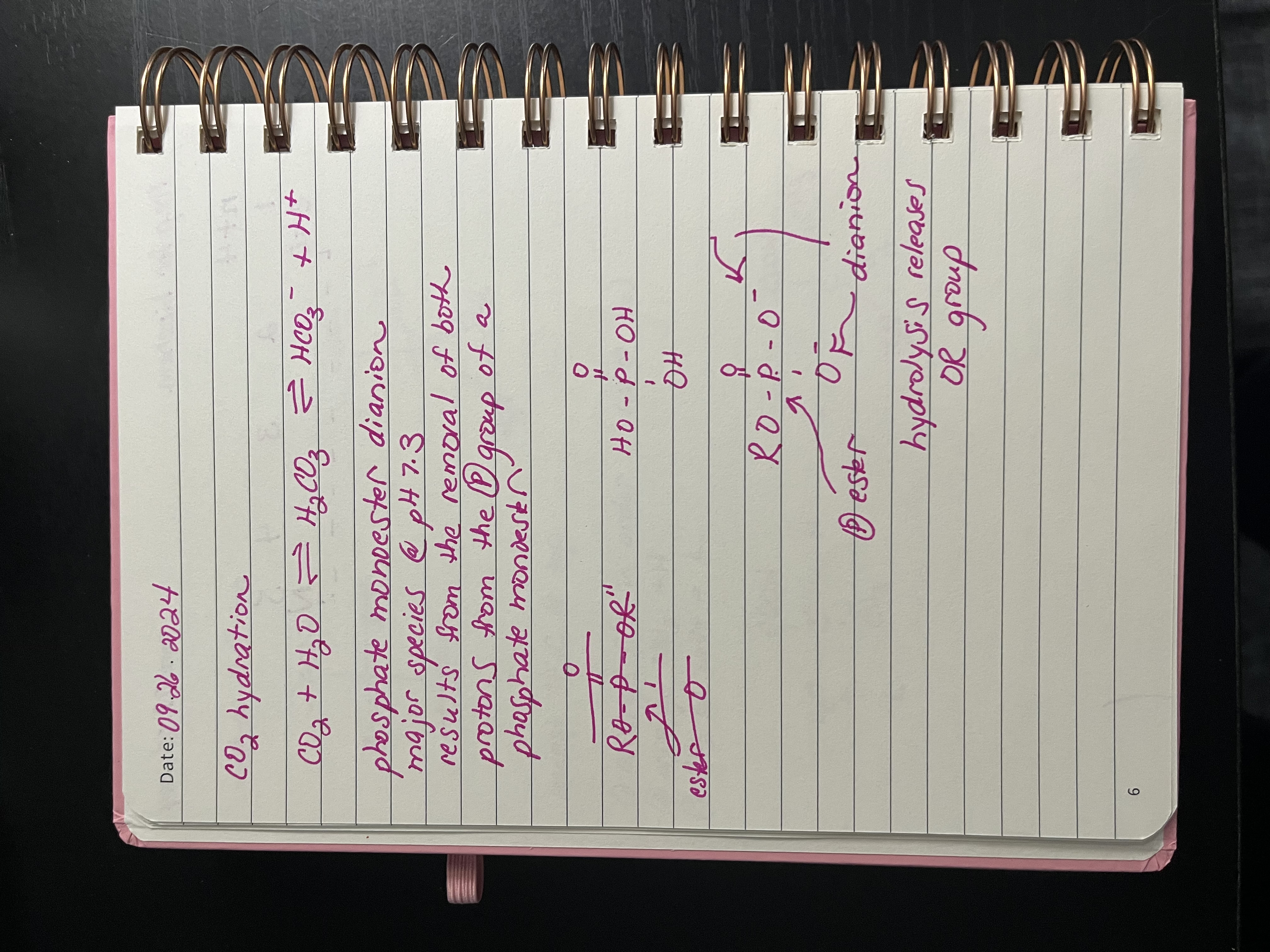
CO2 Hydration Reaction
- Reaction:
- Explanation:
- Carbon dioxide reacts with water to form carbonic acid ().
- This can dissociate into bicarbonate () and a hydrogen ion ().
- The equilibrium indicates this reaction can proceed in either direction depending on concentration and pH.
- Explanation:
Phosphate Species
- Phosphate Monester Dianion
- Major species at pH 7.3.
- Results from the removal of both protons from the phosphate group of a phosphate monester.
- Structure:
- Components:
- Ester: The group is attached, indicating the presence of an ester functional group.
- Phosphate Linkage: Phosphate typically has a tetravalent phosphorus atom surrounded by oxygen.
- Components:
Hydrolysis
- Process:
- Hydrolysis releases the ester or other functional groups, indicating that the phosphate may break down in the presence of water.
- This can be crucial in biological systems for the release of energy or for the recycling of phosphate groups in biochemical pathways.
Summary:
Understanding the hydration of CO2 and the dynamics of phosphate systems at physiological pH is essential in biochemistry, particularly in metabolic pathways and energy transfer.
Extended readings:
Biochem Exam Notes - 2024-09-24
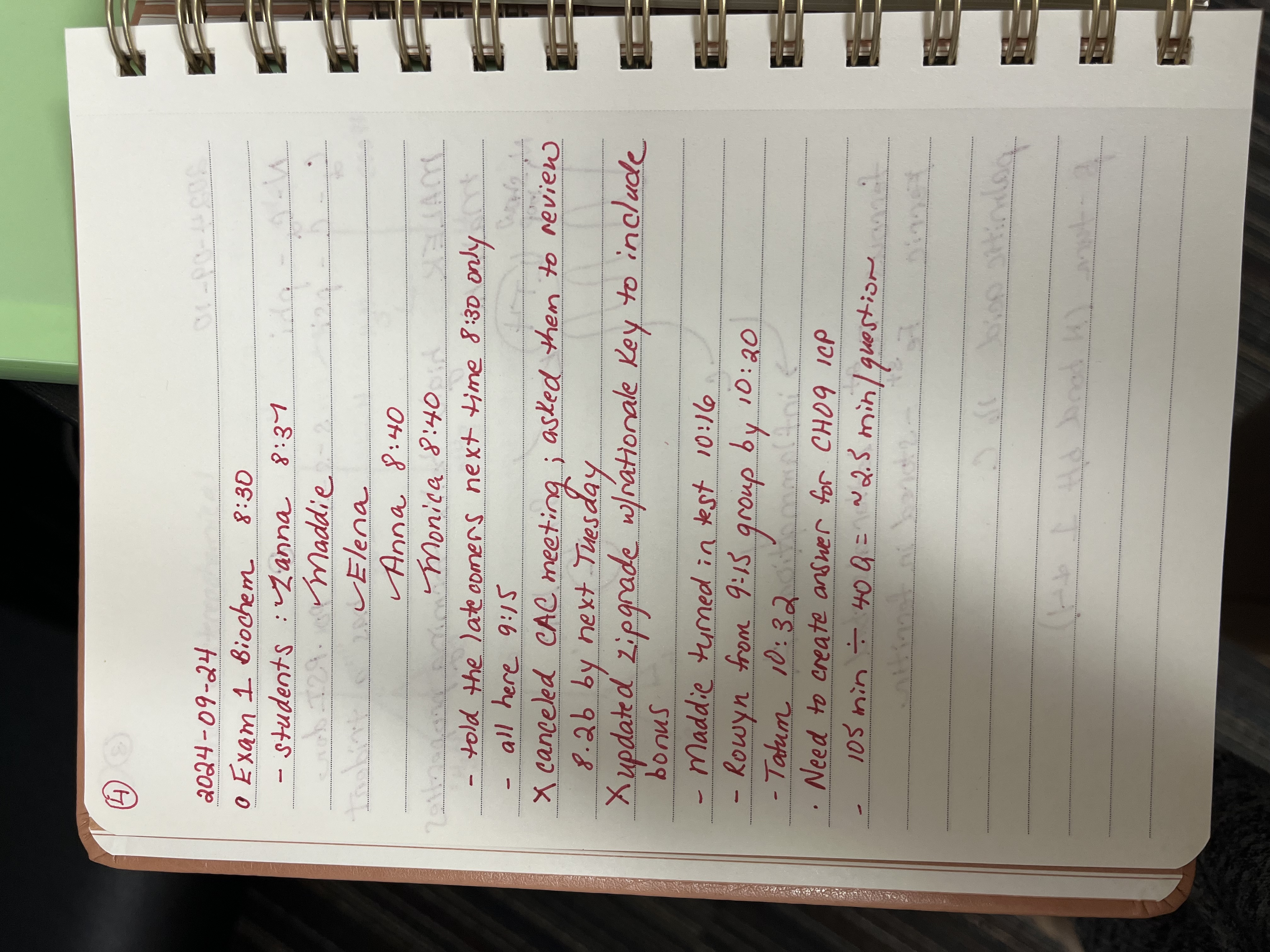
Overview of Exam 1
- Subject: Biochemistry
- Scheduled Time: 8:30 AM
Student Attendance
| Name | Arrival Time |
|---|---|
| Anna | 8:30 AM |
| Maddie | 8:31 AM |
| Elena | 8:40 AM |
| Anna | 8:40 AM |
| Monica | 8:40 AM |
Thoughts: It's important for students to arrive on time for exams to avoid distractions and to ensure they can complete the exam without any time pressure.
Latecomers Notice
- Next Time Meeting Time for Latecomers: 8:30 AM only
- All Present at: 9:15 AM
Ideas: Implementing a strict start time may encourage punctuality among students. It could be beneficial to establish a grace period before enforcing strict rules.
Meeting and Assignments
- Canceled CAC Meeting: Asked to review 8.2b by next Tuesday.
Summary: It's essential to keep track of cancelled meetings and deadlines for assignments. Regularly reviewing material ahead of deadlines helps students stay on top of their coursework.
Test Returns
- Maddie's Test Submission: 10:16 AM
- Rowyn's Submission from 9:15 Group: By 10:20 AM
- Tatum's Submission: 10:32 AM
Observation: Keeping track of submission times can help manage and organize the grading process, allowing for timely feedback to students.
Additional Notes
- Need to Create Answer for CH09 ICP:
- Total Time for Exam Preparation: 105 minutes for 40 questions
- Average Time per Question: ~2.5 minutes/question
Reflection: Efficient time management is crucial during exams to ensure all questions are attempted. Preparing answers in advance can streamline the process and make better use of time.
Boot Camp Workout Notes
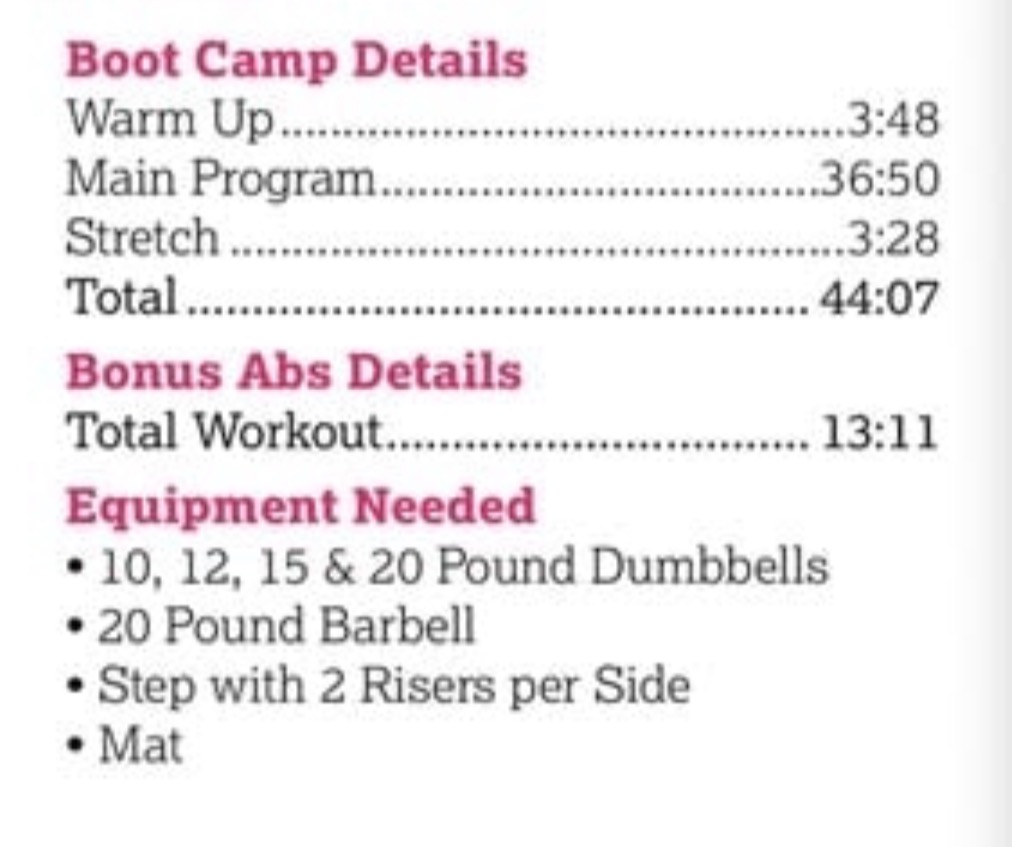
Boot Camp Details
-
Warm Up: 3:48
Importance of warming up before exercise is crucial to prepare the muscles and prevent injuries. -
Main Program: 36:50
This is the core part of the workout where most of the physical activity occurs. It's essential to include a variety of exercises targeting different muscle groups. -
Stretch: 3:28
Cooling down and stretching help in muscle recovery and flexibility. It's important not to skip this phase after an intense workout. -
Total Duration: 44:07
This total indicates a well-rounded session that balances warm-up, main workout, and cooldown.
Bonus Abs Details
- Total Workout Duration: 13:11
Incorporating bonus workouts, such as abs exercises, enhances core strength, which is vital for overall fitness and stability.
Equipment Needed
| Equipment | Description |
|---|---|
| 10, 12, 15 & 20 Pound Dumbbells | Various weights allow for progressive overload and customization of workouts based on fitness levels. |
| 20 Pound Barbell | Useful for a range of strength training exercises; adds resistance to movements. |
| Step with 2 Risers per Side | Enhances cardiovascular fitness and can be used for varied exercises targeting legs and glutes. |
| Mat | Provides comfort and support for floor exercises and stretches. |
Using the right equipment not only aids in effective workouts but also ensures safety and comfort for participants during exercises.
Extended readings:
Bachelor of Science in Biology - Biochemical Analysis Track
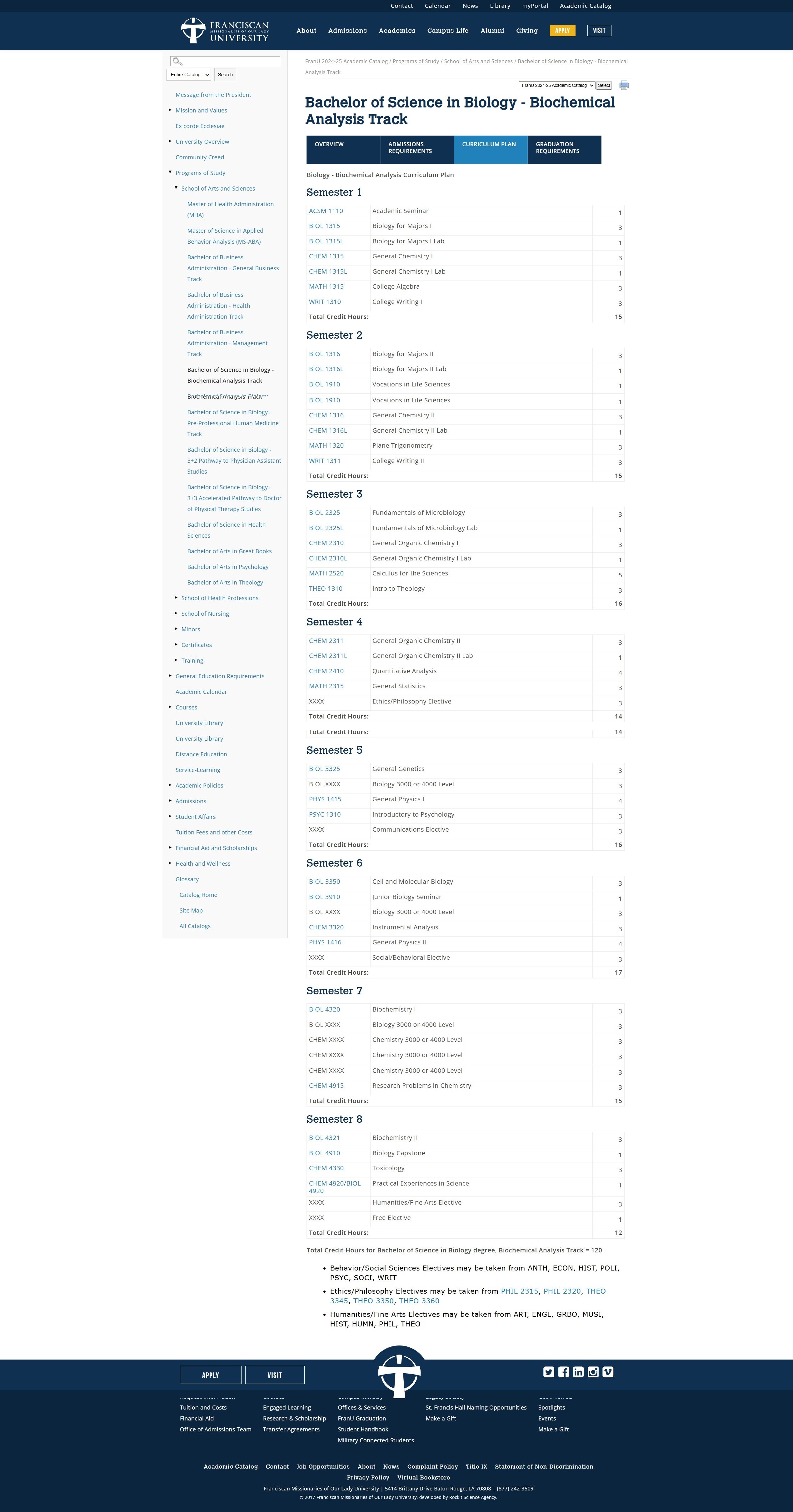
Overview
The image outlines the curriculum for a Bachelor of Science in Biology with a focus on the Biochemical Analysis Track at Franciscan University. Below is a detailed breakdown of the curriculum plan by semester.
Curriculum Plan
| Semester | Course Code | Course Title | Credit Hours |
|---|---|---|---|
| 1 | ACSM 1110 | Academic Seminar | 1 |
| BIOL 1315 | Biology for Majors I | 3 | |
| BIOL 1315L | Biology for Majors I Lab | 1 | |
| CHEM 1315 | General Chemistry I | 3 | |
| CHEM 1315L | General Chemistry I Lab | 1 | |
| MATH 1315 | College Algebra | 3 | |
| WRIT 1310 | College Writing | 3 | |
| Total Credit Hours | 15 | ||
| ---------- | ------------- | ------------------------------------------------- | -------------- |
| 2 | BIOL 1316 | Biology for Majors II | 3 |
| BIOL 1316L | Biology for Majors II Lab | 1 | |
| BIOL 1910 | Vocations in Life Sciences | 1 | |
| CHEM 1316 | General Chemistry II | 3 | |
| CHEM 1316L | General Chemistry II Lab | 1 | |
| MATH 1320 | Plane Trigonometry | 3 | |
| WRIT 1311 | College Writing I | 3 | |
| Total Credit Hours | 16 | ||
| ---------- | ------------- | ------------------------------------------------- | -------------- |
| 3 | BIOL 2325 | Fundamentals of Microbiology | 3 |
| BIOL 2325L | Fundamentals of Microbiology Lab | 1 | |
| CHEM 2310 | General Organic Chemistry I | 3 | |
| CHEM 2310L | General Organic Chemistry I Lab | 1 | |
| MATH 2520 | Calculus for the Sciences | 3 | |
| THEO 1310 | Intro to Theology | 3 | |
| Total Credit Hours | 16 | ||
| ---------- | ------------- | ------------------------------------------------- | -------------- |
| 4 | CHEM 2311 | General Organic Chemistry II | 3 |
| CHEM 2311L | General Organic Chemistry II Lab | 1 | |
| CHEM 2410 | Quantitative Analysis | 3 | |
| MATH 2315 | General Statistics | 3 | |
| XXXX | Ethics/Philosophy Elective | 3 | |
| Total Credit Hours | 14 | ||
| ---------- | ------------- | ------------------------------------------------- | -------------- |
| 5 | BIOL 3325 | General Genetics | 3 |
| BIOL XXXX | Biology 3000 or 4000 Level | 3 | |
| PHYS 1415 | General Physics I | 3 | |
| PSYC 1310 | Introductory to Psychology | 3 | |
| XXXX | Communications Elective | 3 | |
| Total Credit Hours | 15 | ||
| ---------- | ------------- | ------------------------------------------------- | -------------- |
| 6 | BIOL 3350 | Cell and Molecular Biology | 3 |
| BIOL 3900 | Junior Biology Seminar | 1 | |
| CHEM 3320 | Instrumental Analysis | 3 | |
| PHYS 1416 | General Physics II | 3 | |
| XXXX | Elective | 3 | |
| Total Credit Hours | 17 | ||
| ---------- | ------------- | ------------------------------------------------- | -------------- |
| 7 | BIOL 4320 | Biochemistry I | 3 |
| BIOL XXXX | Biology 3000 or 4000 Level | 3 | |
| CHEM XXXX | Chemistry 3000 or 4000 Level | 3 | |
| CHEM XXXX | Chemistry 3000 or 4000 Level | 3 | |
| CHEM 4915 | Research Problems in Chemistry | 1 | |
| Total Credit Hours | 13 | ||
| ---------- | ------------- | ------------------------------------------------- | -------------- |
| 8 | BIOL 4321 | Biochemistry II | 3 |
| BIOL 4910 | Biology Capstone | 3 | |
| CHEM 4330 | Toxicology | 3 | |
| CHEM XXXX | Elective | 3 | |
| XXXX | Humanities/Arts Elective | 3 | |
| Total Credit Hours | 15 |
Note on Electives
- Behavioral/Social Sciences Electives can be taken from courses such as PSYC, SOCI, WRT.
- Ethics/Philosophy Electives may include specific philosophy courses such as PHIL 2315, PHIL 2320, or electives from theology.
Summary
This curriculum is thoughtfully designed to equip students with comprehensive knowledge in biology and its applications, emphasizing biochemical analysis. The integration of laboratory work alongside courses enables students to gain practical experience that complements theoretical learning.
Extended readings:
Bachelor of Science in Biology - Pre-Professional Human Medicine Track Notes
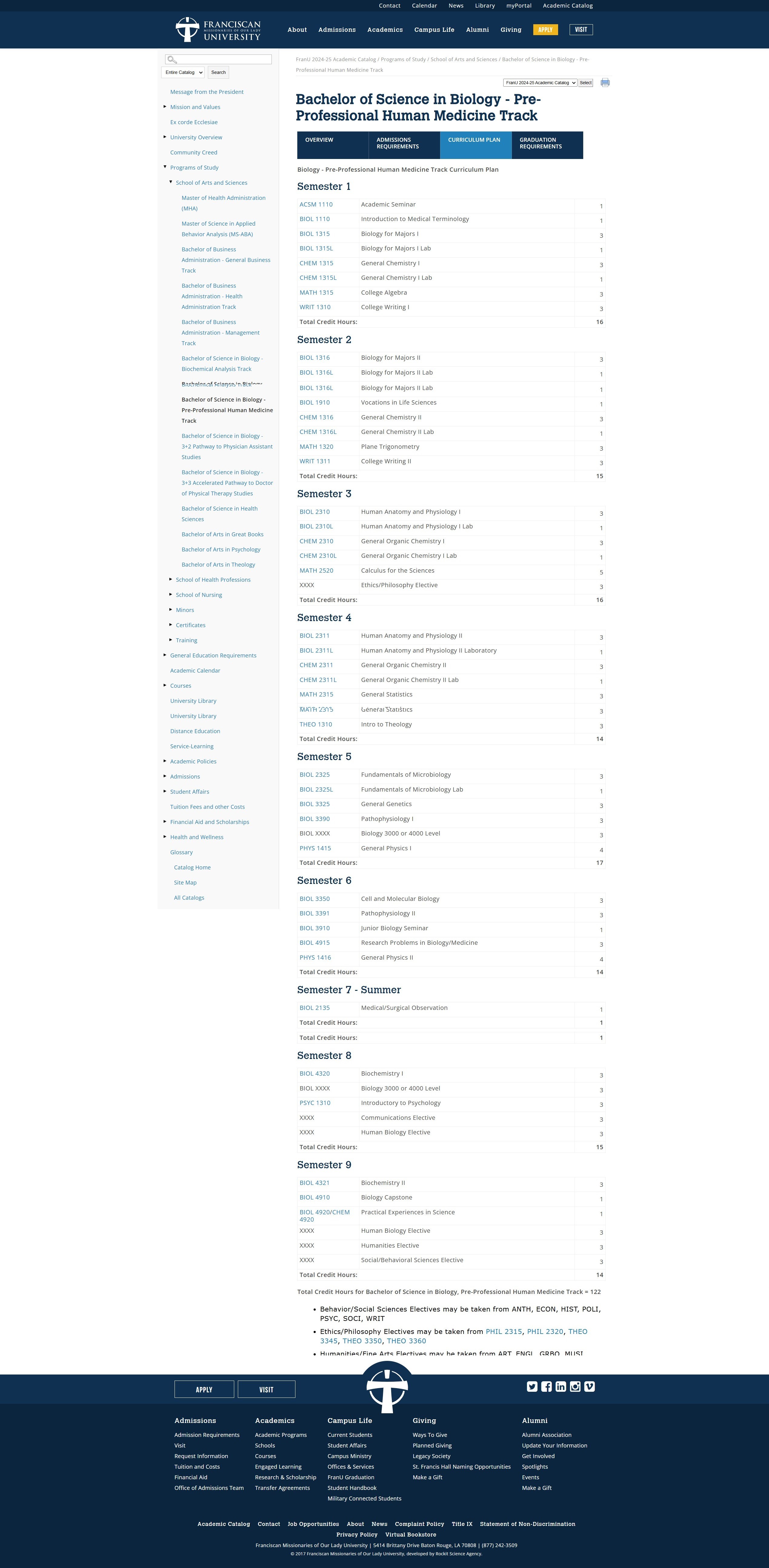
Overview of Curriculum
The Bachelor of Science in Biology with a Pre-Professional Human Medicine Track is designed to provide students with a robust foundation in biological sciences while preparing them for medical and related professional schools. The curriculum integrates various disciplines, including chemistry, physics, and ethics, to give a comprehensive education.
Curriculum Breakdown
Semester 1
| Course Code | Course Title | Credit Hours |
|---|---|---|
| ACM 1110 | Academic Seminar | 1 |
| BIOL 1110 | Introduction to Medical Terminology | 3 |
| BIOL 1315 | Biology for Majors I | 3 |
| BIOL 1315L | Biology for Majors I Lab | 1 |
| CHEM 1315 | General Chemistry I | 3 |
| CHEM 1315L | General Chemistry I Lab | 1 |
| MATH 1315 | College Algebra | 3 |
| WRT 1310 | College Writing | 3 |
| Total | 15 |
Thoughts: The first semester starts with foundational courses that establish essential skills in writing and mathematics, along with introductory biology and chemistry.
Semester 2
| Course Code | Course Title | Credit Hours |
|---|---|---|
| BIOL 1316 | Biology for Majors II | 3 |
| BIOL 1316L | Biology for Majors II Lab | 1 |
| CHEM 1316 | General Chemistry II | 3 |
| CHEM 1316L | General Chemistry II Lab | 1 |
| MATH 1320 | Plane Trigonometry | 3 |
| WRT 1311 | College Writing II | 3 |
| Total | 14 |
Thoughts: The second semester builds on the first by deepening the students' understanding of biology and chemistry while reinforcing writing skills.
Semester 3
| Course Code | Course Title | Credit Hours |
|---|---|---|
| BIOL 2310 | Human Anatomy and Physiology I | 3 |
| BIOL 2310L | Human Anatomy and Physiology I Lab | 1 |
| CHEM 2310 | General Organic Chemistry I | 3 |
| CHEM 2310L | General Organic Chemistry I Lab | 1 |
| MATH 2520 | Calculus for the Sciences | 3 |
| XXXX | Ethics/Philosophy Elective | 3 |
| Total | 16 |
Thoughts: This semester introduces advanced biology courses and calculus, critical for understanding physiological processes.
Semester 4
| Course Code | Course Title | Credit Hours |
|---|---|---|
| BIOL 2311 | Human Anatomy and Physiology II | 3 |
| BIOL 2311L | Human Anatomy and Physiology II Lab | 1 |
| CHEM 2311 | General Organic Chemistry II | 3 |
| CHEM 2311L | General Organic Chemistry II Lab | 1 |
| MATH 2315 | General Statistics | 3 |
| THEO 1310 | Intro to Theology | 3 |
| Total | 14 |
Thoughts: The focus shifts to human anatomy's second part, emphasizing the importance of statistical reasoning.
Semester 5
| Course Code | Course Title | Credit Hours |
|---|---|---|
| BIOL 2325 | Fundamentals of Microbiology | 3 |
| BIOL 2325L | Fundamentals of Microbiology Lab | 1 |
| BIOL 3335 | General Genetics | 3 |
| BIOL 3336 | Pathophysiology | 3 |
| PHYS 1415 | General Physics I | 4 |
| Total | 17 |
Thoughts: This semester begins to intertwine microbiology and genetics, critical for understanding diseases.
Semester 6
| Course Code | Course Title | Credit Hours |
|---|---|---|
| BIOL 3360 | Cell and Molecular Biology | 3 |
| BIOL 3391 | Pathophysiology II | 3 |
| PHYS 1416 | General Physics II | 4 |
| XXXX | Human Biology Elective | 3 |
| Total | 14 |
Thoughts: Advanced topics in cellular biology and continuing physics are vital for medical applications.
Semester 7 - Summer
| Course Code | Course Title | Credit Hours |
|---|---|---|
| BIOL 2135 | Medical/Surgical Observation | 1 |
| Total | 1 |
Thoughts: Practical experience through medical observation is crucial for applying theoretical knowledge.
Semester 8
| Course Code | Course Title | Credit Hours |
|---|---|---|
| BIOL 4320 | Biochemistry I | 3 |
| BIOL XXX | Biology 300 or 400 Level | 3 |
| PSYC 1310 | Introductory Psychology | 3 |
| XXXX | Human Biology Elective | 3 |
| Total | 15 |
Thoughts: The introduction to biochemistry is pivotal for understanding metabolic processes.
Semester 9
| Course Code | Course Title | Credit Hours |
|---|---|---|
| BIOL 4321 | Biochemistry II | 3 |
| BIOL 4910 | Biology Capstone | 3 |
| BIOL 4920/CHIM | Practical Experiences in Science | 1 |
| XXXX | Social/Behavioral Sciences Elective | 3 |
| Total | 14 |
Thoughts: The final semester culminates in a capstone project, integrating all learned material and preparing students for professional challenges ahead.
Additional Information
- Students are encouraged to engage in elective courses that enhance their understanding of the behavioral sciences and ethics, which are valuable in a medical context.
- The total credit hours required for graduation are 122, indicating a rigorous and comprehensive curriculum designed to equip students for advanced studies or professional careers in medicine and biology.
Extended readings:
Meeting Notes - 10/8/24
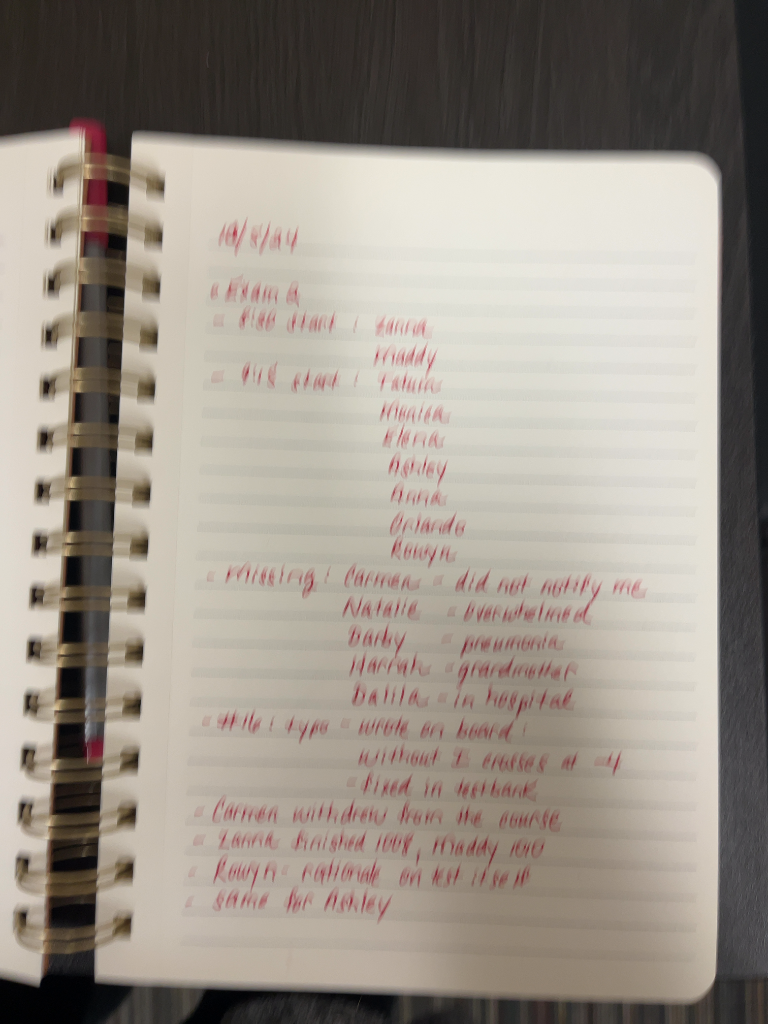
Exam Details
- Exam B:
- Time: 8:30 AM
- Attendees:
- Haddy
- Laura
- Maddie
- Hannah
- Elena
- Ashley
- Daniel
Thoughts:
- Ensure all students understand the schedule to avoid late arrivals.
- Consider sending reminders a day before the exam.
Missing Participants
- Participants Not Present:
- Carina: Did not notify.
- Natalie: Overwhelmed.
- Darby: Unavailable.
- Hannah: Grandmother's health concerns.
- Dalila: In hospital.
Thoughts:
- Reach out to missing attendees to check on their well-being and offer support.
- Discuss the need for a procedure regarding notification of absences.
Type of Notes
- Format: Notes were written on the board.
- Without references at 4 PM
- Fixed in the test bank.
Thoughts:
- Ensure clarity in the note-taking process to improve understanding among all attendees.
Additional Notes
- Carina: Withdrew from the course.
- Laura: Finished soon; Maddie to review.
- Rowyn: Rational on test results.
- Similarly for Ashley: Need confirmation on her status.
Ideas:
- Discuss the implications of course withdrawals and how to support students who are struggling.
- Consider creating a support group or resources for overwhelmed students.
Extended readings:
Exam Notes (10/5/24)
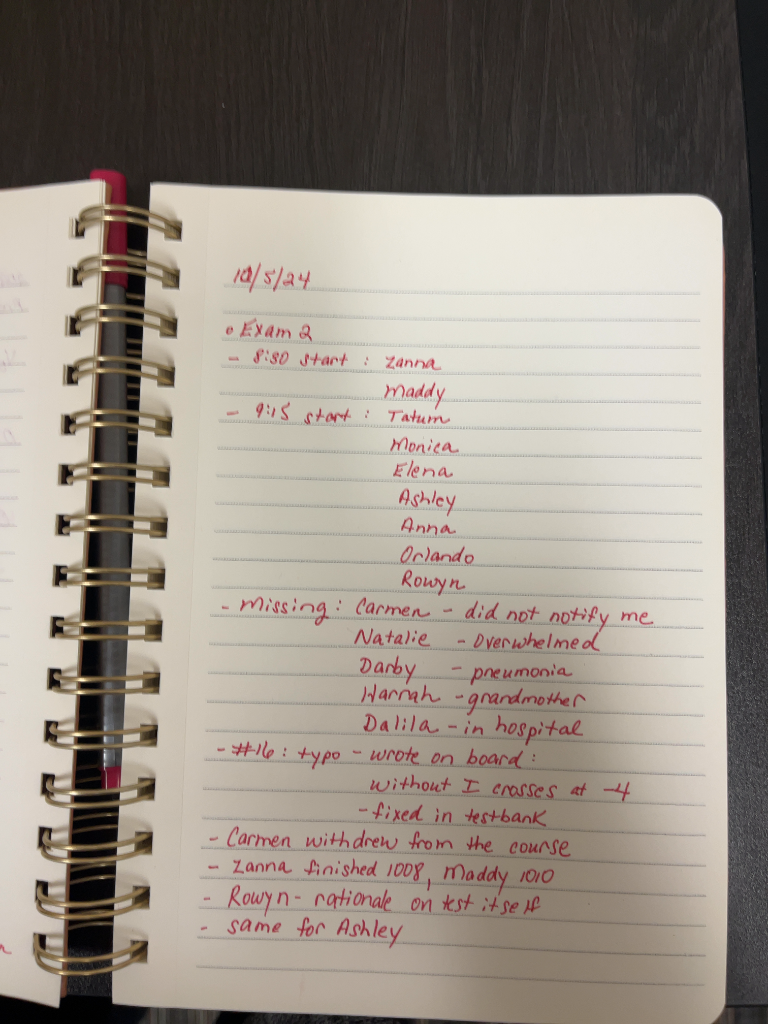
Exam Details
| Time | Student |
|---|---|
| 8:30 | Zanna |
| 9:15 | Maddy |
| 9:15 | Tahira |
| 9:15 | Monica |
| 9:15 | Elena |
| 9:15 | Ashley |
| Anna | |
| Orlando | |
| Rowyn |
Thoughts:
- It's important to note the start times for each student to ensure no one is late and to facilitate proper spacing for exam monitoring.
Missing Students
- Carmen: Did not notify me of absence.
- Natalie: Overwhelmed situation reported.
- Darby: Unable to attend due to pneumonia.
- Hannah: Grandmother's situation may be affecting attendance.
- Dalila: Currently in the hospital.
Thoughts:
- Communication with students who are unable to attend is crucial. It may be beneficial to set up a system for students to report their status more effectively, especially in cases of health-related issues.
Notes on Exam Adjustments
- Typo Issue: Wrote on the board that certain items were overlooked, corrected to cross out errors at question 4.
- Test Bank Update: Corrections have been applied to ensure accurate assessment for future exams.
Thoughts:
- Keeping accurate records of errors made during the exam setup is vital for improving the process. Reviewing and updating the test bank regularly can help prevent future issues.
Overall Student Performance
- Carmen: Withdrew from the course, possibly indicating a need for support systems for struggling students.
- Zanna, Maddy: Achieved scores of 100% and 101% respectively, showcasing their strong performance.
- Rowyn: Rationalizing their test performance could help identify areas for improvement—perhaps establishing feedback sessions would be beneficial.
- Same for Ashley: Individual review could provide insights into barriers faced during exams.
Thoughts:
- Monitoring student performance closely can help in identifying trends that may require intervention, such as additional resources or support for those who are struggling. Tracking high achievers can also aid in developing peer mentorship programs.
Extended readings:
Biochemistry Notes

Exam Schedule
- Date: 10/5/24
- Event: Exam 2
- 8:30 AM Start:
- Zanna
- Maddy
- 9:15 AM Start:
- Tatum
- Monica
- Elena
- Ashley
- Anna
- Orlando
- 8:30 AM Start:
Biochemical Concepts
- Date: 10/9/2024
- Topic: Enzyme Kinetics
- Key Points:
- Two equilibria in the enzyme-substrate complex formation.
- Important equations:
- (Where E = enzyme, S = substrate, ES = enzyme-substrate complex)
- dependent on formation of products.
- Key Points:
- Topic: Enzyme Kinetics
Study Suggestions
- Review definitions of terms such as , , , and to build a solid foundation.
- Practice problems related to enzyme kinetics to get familiar with how to apply the equations.
- Consider forming study groups for discussing these topics as they can be complex and benefit from collaboration.
Extended readings: